Marcos Pizzelli is one of the rare footballers who have the love and respect of all fans of their respective clubs and country. In Armenia, he is among the fan favorites, and the reason is that Marcos himself gives a lot of love to Armenia and Armenian fans.
Interviewing Marcos is always fun, and what matter the most, every interview turns out very interesting. This time too Mediamax Sport had a great talk with Marcos, making jokes, teaching him new world in Armenian and discussing delicious Brazilian fruit.
Loving Armenia unreservedly
-Marcos, you’ve become one of our own in Armenia, although you’re from Brazil. What did you like about Armenia so much that it made you feel like home?
-First of all, I am grateful to Armenia for giving me a chance to show my game and play for the country. I will never forget it. I really liked the people here too. 13 years ago, when I moved to Armenia to play for Ararat, people helped me a lot. Of course, I wasn’t known in Armenia then, but people still supported me and helped me achieve my goals. That is why I have such love and respect for Armenia.
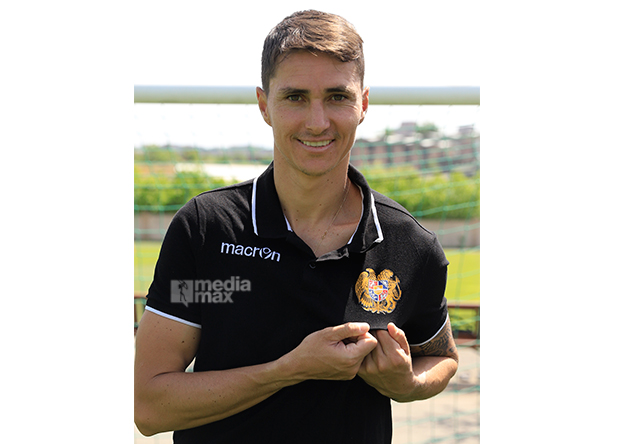
Photo: Mediamax
-How did you go from a regular player to the nation’s favorite?
-It wasn’t an easy road. Everything was so hard when I just came here. It was difficult to get used to the language, the food, even the pitch. I knew just one thing: I would do everything possible to play well. I couldn’t even dream of joining the national team back then, but when you do something good, life gives something good back to you.
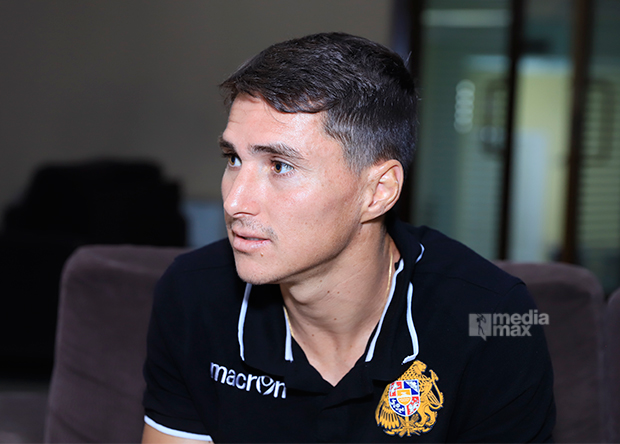
Photo: Mediamax
Ararat had a good squad. The club won the cup and finished second in the league, so perhaps that is why the federation noticed me. Varuzhan Sukiasyan told me I had potential and could help the national team. The team needed a change of generation in 2007 and I was quite young. That is why the federation’s president and Varuzhan Sukiasyan talked to me about joining the team.
-How did you receive the call up to the national team?
-I remember it so well, like it happened yesterday. I didn’t think for a minute before accepting the offer. I moved to Armenia in 2006 and my first season here was not that good. I was even thinking of going back to Brazil, because it was so difficult here and I missed my family so much. But 2007/2008 was good, I became Armenia’s best forward and played well. Mr. Sukiasyan promised he would speak to Ruben Hayrapetyan (then President of the Football Federation - Mediamax Sport) if I kept doing so well. In the summer of 2008, I met with him and he asked at once if I wanted to get Armenian citizenship. I immediately replied: “Yes.”
-You played your first game for Armenia that year. How did it feel?
-I will never forget that game. It was one of the happiest moments of my career. I didn’t sleep that night, because everything was so new, and I knew the whole nation would be watching, and people had expectations. Playing for the country is a different level and I was worried if I could do my best. My thoughts were in a mess, I was overthinking everything. Usually the nervousness and uncertainty go away when the game starts, and that time wasn’t an exception.
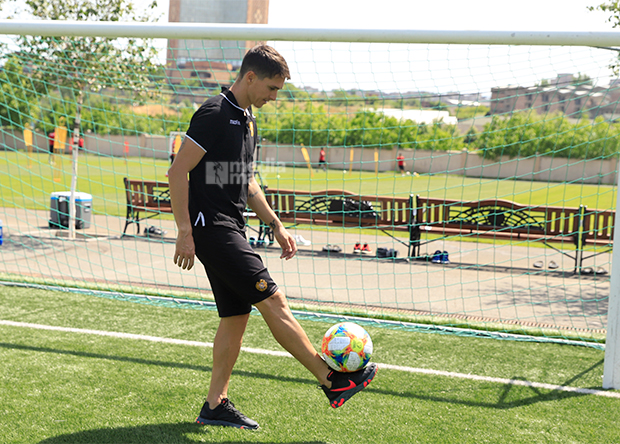
Photo: Mediamax
-You had a good game and scored a goal from Levon Pachajyan’s pass.
-I don’t think I played well that time. Sometimes you don’t play well, but you still score a goal and people call the Man of the Match. It happens in football (laughs – Mediamax Sport).
Settling in Armenia and learning the language
-Let’s go back in time and recall your first day in Armenia.
-It was late February of 2006. I went straight to Orbeli Street from the airport, because that is where Ararat’s Brazilian players lived. I was lucky that Renato could speak Armenian, he helped me so much. It was difficult in the beginning. I lived in a small town in Brazil, I was always close to my family and I spent my weekends with them. I played football in the city that was 50km away from my town. I used to cry because I missed them so much, I would want to call them every day. My wife Natalie and I just started dating at that time. I thought I couldn’t stay so far away from people I loved, but on the pitch, you forget about your problems. Thank God I stayed here.
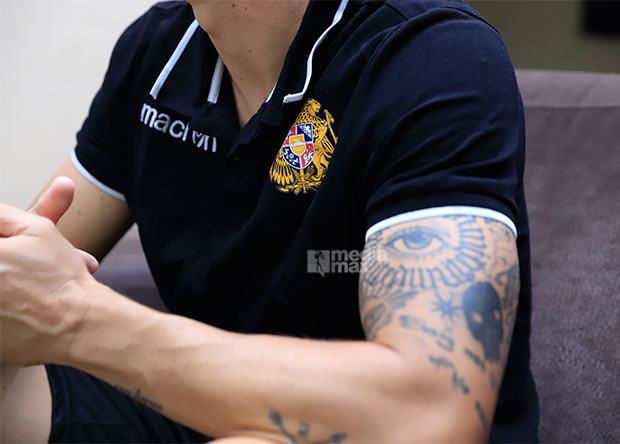
Photo: Mediamax
-What was football like in Armenia then? Was it very different from what you were used to?
-The difference wasn’t huge. In Brazil, we played a bit slower and focused on playing with the ball, and here the game was faster and more physical. I had trouble settling in the first year. In Brazil, technique is stronger.
-You started the Armenian period of your career at FC Ararat. What did the club give you?
-There were two aspects in my relations with Ararat. First, gratitude. I am very grateful to the club for signing me. The other aspect is not so good. I wasn’t treated well and I can’t forget that. However, I prefer to keep in mind first that Ararat opened some big doors for me.
-Next, you played for another Armenian club, Pyunik. How was life for you in that period?
-Everything was different. I could speak Armenian, I played for the national team. The boys – Karlen Mkrtchyan, Gevorg Ghazaryan, Edgar Malakyan and David Manoyan – and I were like a family. Pyunik was the best team I ever played in. Other players supported me in every way. We had success on the pitch too in those years. Our team was strong and full of potential, we played some good football, and I miss those times.
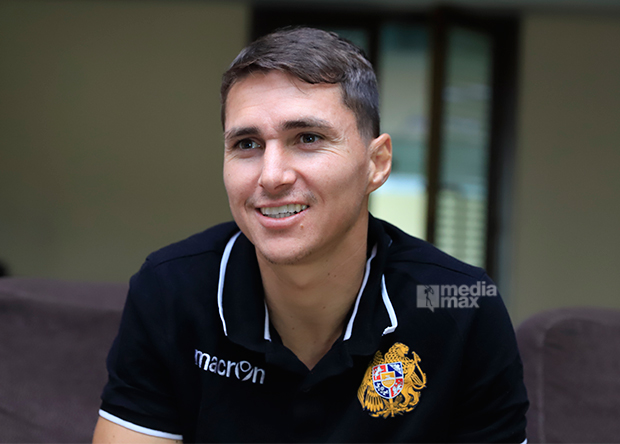
Photo: Mediamax
-Armenian is not an easy language to learn, but you’ve become quite fluent in it. How did you achieve that?
-Armenian is really difficult. I still make mistakes, keep forgetting certain words. But I like to learn things, and it helped me learn Armenian. In my team, David Manoyan spoke English, so I could talk with him, but I was playing for an Armenian club and it was shameful not to try to learn the language. I started with “hello” and “how are you”, and then learned the rest.
-Did you ever think you would settle in Armenia?
-Not at first, of course, but gradually I started feeling very good here. I consider coming here after I finish my career. I love Armenia. Everybody knows I am happy to get the call up to the national team. Even when I don’t, I send a letter to the federation, telling them I want to play. I know I have to play well for my club and get noticed by the coaches to be included in the national team.
-Marcos, you also played with the captain armband. What did it mean to you?
-People know that I feel myself as an Armenian, but when I found out that I would be the captain, I was happy. I understood what captains felt, when the team was on the pitch. It is a great responsibility: you need to help footballers around you, talk to them at locker room and motivate them. I did all that I could do to accomplish decently that responsibility.
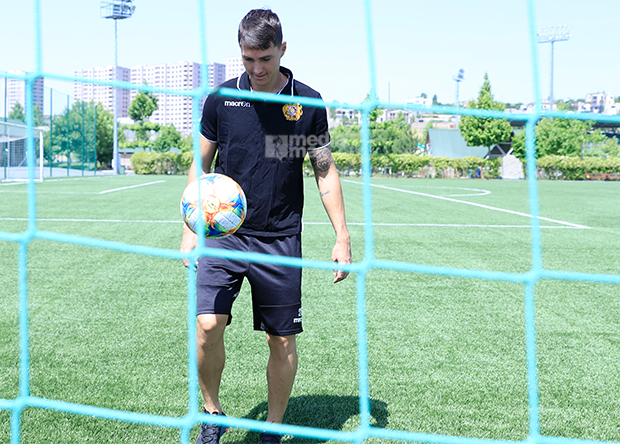
Photo: Mediamax
-Did you plan to kiss Armenia’s coat of arms after the goal?
-Having scored a goal against Andorra, I did that. No, I didn’t plan that, but it felt right to do so.
-Marcos, you love Armenian fans, and you are loved by them. How did you develop such warm relations with them?
-I have no idea how everything happened this way. I have heard on many occasions that Armenians love and respect me, as I love Armenia very much. People know that I do my best for the team. I talk about Armenia in all my interviews, I am not afraid to tell about my love for this country. I tell both good and bad things, I am not ashamed of speaking after a failed match. I showed people the real Marcos, which is why they like me.
Armenia’s potential and level of Armenian Premier League
-Many of our footballers don’t give interviews after failures, but you talk and explain even the bad matches. How do you find the right words at those moments?
-We should respect journalists just as they respect us. You prepare for the match a week earlier, wait for conversations with us, and I find leaving without a word after the failed matches to be a wrong approach. When you are nervous, you should speak carefully, but never be silent. Football doesn’t imply only victories, we shouldn’t leave questions unanswered. The whole nation is watching the matches and expecting explanations. Regardless of the outcome of the matches, one should be a man and admit that given match was unsuccessful.
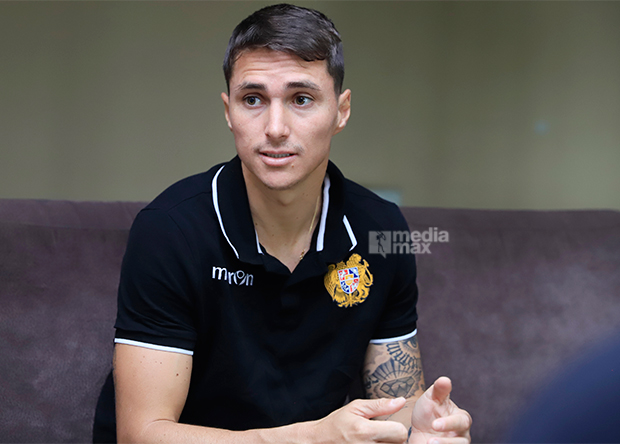
Photo: Mediamax
-What is the potential of Armenia’s current national team?
-We all expect to tackle the group stage in all tournaments. I believe that our team has great potential, but we still have several issues. First of all, Armenian Premier League is very weak. People come to the national team, and the quality, the level and speed is different here. It’s impossible to achieve something with several footballers only. The time passes, we have become older, and it’s time for younger footballers to join the team. Football Federation of Armenia should work hard to bring the national championship to a higher level.
It takes time to educate a good generation of footballers; they need to develop, strengthen, participate in other tournaments, and start being useful for the national team.
Besides, the national team needs more than 11 footballers. A footballer with an injury should be replaced by a player of the same level, and we have this issue today.
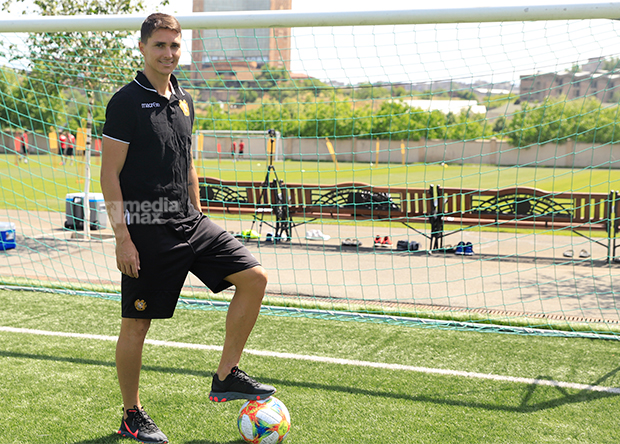
Photo: Mediamax
Let’s take one more circumstance into consideration. Football changes quickly, and Armenia shouldn’t fall behind; we need to learn constantly. I always play to win, I want to do something for Armenia, but we need to plan ahead to have a good national team in 10 years. There are plenty of examples, Albania and Iceland, for instance. The size of the country isn’t important; it doesn’t matter in modern football.
-Why does our team fail to reach the final? What is missing?
-All members of the team should think the same way. Only one footballer, only Mkhitaryan, cannot do everything. Certainly, he should play well, but it’s wrong to think that Heno should do everything. We should all play well in the team and act together. Our players return from various tournaments, they play at different levels and don’t understand each other. I think this is our main obstacle.
Family’s visit to Armenia and title of the best footballer
-Marcos, it was a special moment for you, when your parents were following your match here in Yerevan. What impressions of Armenia did they get?
-I had been willing to bring them to Armenia for a long time, and I had been telling them a lot about Armenia. Internet wasn’t that developed when I first moved to Armenia, and I used to print photos and bring them with me to Brazil to show them to my family. My parents finally came to Armenia two years ago, and they both liked the country, wishing to repeat the visit. I spent only a day with them, since I was at a training camp. I led them to places where I had lived in Yerevan. Then they had tours with my wife; they visited Echmiadzin as well.
When I finish my career one day, I will come to Armenia with my parents and live here for several months. We will visit various places and I will be able to introduce them to our country better.
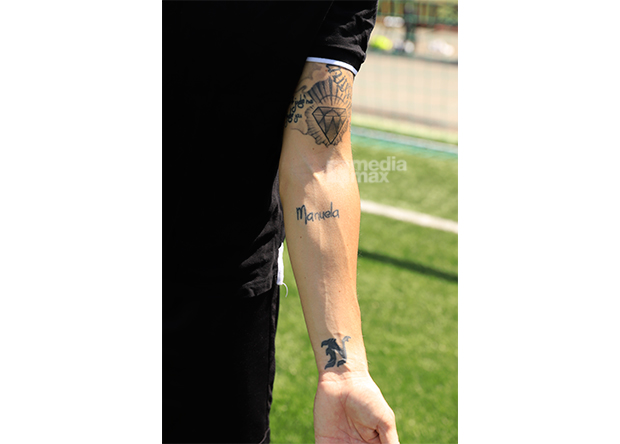
Photo: Mediamax
-Let’s talk about your wife now, who plays an important part in your life.
-Natalie is a very important person for me; I wouldn’t have been the Marcos that I am today without her. People only see me playing football, and they have no idea that there is someone at home who helps me a lot and makes sure I think only about football during matches.
We had been dating for a year when I moved to Armenia. It was a very short period to leave everything behind and come here with me. It was tough at the beginning, but then I met her parents, and they saw that I was a good guy (laughs-Mediamax). We lived together in Yerevan some time later.
She didn’t like Armenia at the beginning, but then she started to like it very much. My daughter Manuella doesn’t understand yet when she is in Armenia and when she is in Brazil. I will tell her a lot about Armenia when she grows up.
-You were recognized Armenia’s Football Player of the Year in 2018. How important is it for a footballer to win such a title?
-I wouldn’t be honest if I said that’s not important. I am happy for the title, especially when we know that Mkhitaryan is a strong Arsenal player, and he won several times in a row. Now it’s my turn.
I love the Armenia national team very much. I wish to see Armenia in finals of EURO or World Cup. I understand how hard it is going to be, but this is my dream, and in case I succeed, I will finish my career. Individual prize means that I have done something good for the team. I hope I will continue to be the first, and Heno will freak out (laughs-Mediamax)
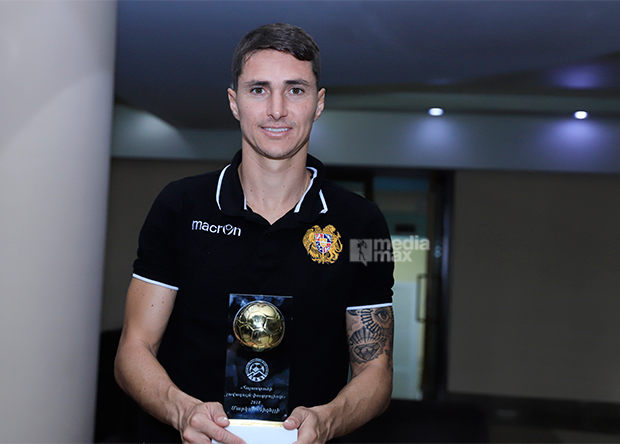
Photo: Mediamax
-You have been recovering from your injury for a long time now. How do you feel now and when are you going to return to the field?
-I feel great now, but I should wait till the recovery is complete. I hope to join the club and the national team in September.
Hasmik Babayan and Gohar Nalbandyan talked to Marcos Pizzelli
Photos by Marianna Petrosyan












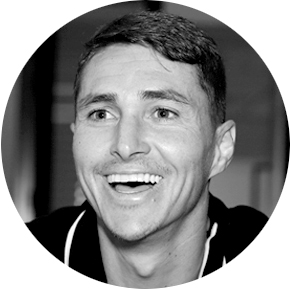
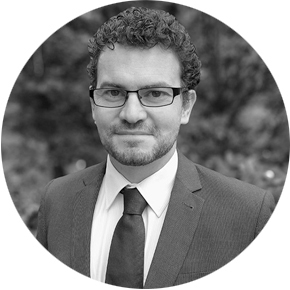
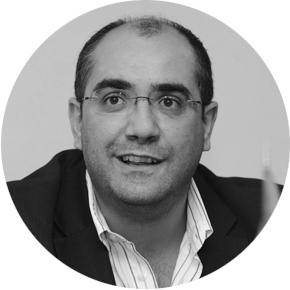




Comments
Dear visitors, You can place your opinion on the material using your Facebook account. Please, be polite and follow our simple rules: you are not allowed to make off - topic comments, place advertisements, use abusive and filthy language. The editorial staff reserves the right to moderate and delete comments in case of breach of the rules.